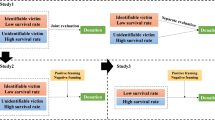Abstract
Does donation box transparency matter in regard to donation behavior? The purpose of this research is to test the effect of donation box transparency on potential donors’ charitable behavior. In a series of experimental studies, including a field experiment, data were collected on willingness to donate and donation amount in three treatments: a wooden donation box (opaque condition), transparent donation box containing very little money, and transparent box almost full of money. Participants in the transparent box treatment were both less willing to donate money and they donated less money compared to subjects in the opaque box treatment. Moreover, data was collected to demonstrate that participants in the transparent box conditions experienced a heightened state of self-sufficiency due to the effect of money exposure. Implications are discussed for theory development and future research avenues and in terms of practical considerations for charity organizations.


Similar content being viewed by others
Change history
07 February 2019
The original version of this article unfortunately contained a mistake. Carter A. Mandirk was not listed among the authors.
07 February 2019
The original version of this article unfortunately contained a mistake. Carter A. Mandirk was not listed among the authors.
References
Aaker, J. L., & Akutsu, S. (2009). Why do people give? The role of identity in giving. Journal of Consumer Psychology, 19(3), 267–270.
Aknin, L. B., Barrington-Leigh, C. P., Dunn, E. W., Helliwell, J. F., Burns, J., Biswas Diener, R., & Kemeza, I. (2013). Prosocial spending and well-being: cross-cultural evidence for a psychological universal. Journal of Personality and Social Psychology, 104, 635–652.
Anik, L., Norton, M. I., & Ariely, D. (2014). Contingent match incentives increase donations. Journal of Marketing Research, 51(6), 790–801.
Caruso, E. M., Shapira, O., & Landy, J. (2017). Show me the money: a systematic exploration of manipulations, moderators, and mechanisms of priming effects. Psychological Science, 28, 1148–1159. https://doi.org/10.1177/0956797617706161.
Charitable Aid Foundation Report (2012). Available at https://www.cafonline.org/about-us/publications/2012-publications/world-giving-index-2012, accessed on Nov 03. 2017.
Gasiorowska, A., & Helka, A. (2012). Psychological consequences of money and money attitudes in dictator game. Polish Psychological Bulletin, 3(1), 20–26.
Guèguen, N. (2013). Redesigning the donation box: The effect of animal banks on donations for animal welfare. Society and Animals, 21(3), 240–248.
Guèguen, N., & Jacob, C. (2013). Behavioral consequences of money: when the automated teller machine reduces helping behavior. The Journal of Socio-Economics, 47, 103–104.
Higgins, E. T., & Brendl, C. M. (1995). Accessibility and applicability: some" activation rules" influencing judgment. Journal of Experimental Social Psychology, 31(3), 218–243.
Lea, S., & Webley, P. (2006). Money as tool, money as drug: the biological psychology of a strong incentive. Behavioral and Brain Sciences, 29(02), 161–176.
Lin-Healy, F., & Small, D. A. (2012). Cheapened altruism: discounting personally affected prosocial actors. Organizational Behavior and Human Decision Processes, 117(2), 269–274.
Meijer, M. (2009). The effects of charity reputation on charitable giving. Corporate Reputation Review, 12(1), 33–42.
Newman, G. E., & Cain, D. M. (2014). Tainted altruism: when doing some good is evaluated as worse than doing no good at all. Psychological Science, 25(3), 648–655.
Schacter, D., & Buckner, R. (1998). Priming and the brain. Neuron, 20(2), 185–195.
Tulving, E., & Schacter, D. (1990). Priming and human memory systems. Science, 247(4940), 301–306.
Vohs, K. (2015). Money priming can change people’s thoughts, feelings, motivations, and behaviors: an update on 10 years of experiments. Journal of Experimental Psycholgy: General, 144(4), e86–e93.
Vohs, K., Mead, N., & Goode, M. (2006). The psychological consequences of money. Science, 314(5802), 1154–1156.
Vohs, K., Mead, N., & Goode, M. (2008). Merely activating the concept of money changes personal and interpersonal behavior. Current Directions in Psychological Science, 17(3), 208–212.
Wang, C., Zhu, R. J., & Handy, T. C. (2015). Experiencing haptic roughness promotes empathy. Journal of Consumer Psychology, 26(3), 350–362.
Whillans, A. V., Dunn, E. W., Sandstrom, G. M., Dickerson, S. S., & Madden, K. M. (2016). Is spending money on others good for your heart? Health Psychology, 35(6), 574–583.
Zhou, X., Vohs, K., & Baumeister, R. (2009). The symbolic power of money: reminders of money alter social distress and physical pain. Psychological Science, 20(6), 700–706.
Author information
Authors and Affiliations
Corresponding author
Rights and permissions
About this article
Cite this article
Ekici, A., Shiri, A. The message in the box: how exposure to money affects charitable giving. Mark Lett 29, 137–149 (2018). https://doi.org/10.1007/s11002-018-9452-y
Published:
Issue Date:
DOI: https://doi.org/10.1007/s11002-018-9452-y



